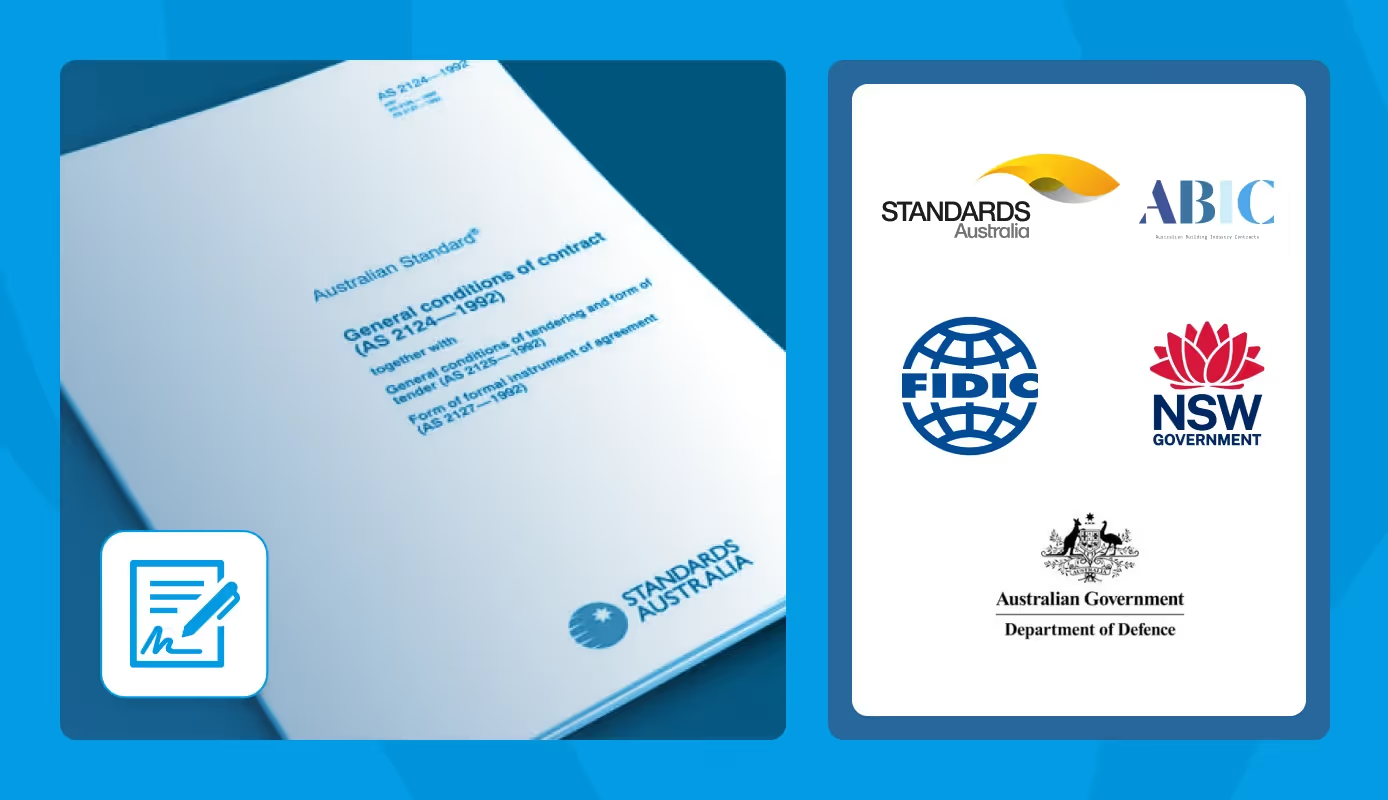When it comes to managing construction projects, success often hinges on understanding the contract terms and conditions that govern the work. These terms outline all parties' rights, responsibilities, and expectations. A solid grasp of these can help project managers avoid disputes, manage risks, and deliver projects on time and within budget.
If you're a construction project manager, this guide will explain the essentials of construction contract terms, key elements to look for, and practical insights to help you navigate this critical aspect of your role.
What Are Standard Contract Terms and Conditions in Construction Contracts?
At their core, standard terms and conditions provide a framework for managing construction projects. These clauses define how risks, obligations, and rewards are allocated among the parties involved.
While the specifics can vary depending on the project and jurisdiction, the following components are commonly included:
- Scope of Work: What services or products will be delivered.
- Responsibilities: Who does what and when.
- Timelines: Key dates, deadlines, and milestones.
- Payments: How and when money changes hands.
- Risk Allocation: Who bears liability for various risks.
These terms ensure that all parties are aligned, reducing ambiguity and helping prevent disputes. A well-drafted contract serves as a roadmap and a safeguard against unexpected challenges. For more guidance, check out this Contract Administration resource.
Key Contract Terms Every Construction Project Manager Should Know
As a construction project manager, understanding the essential terms in a contract is critical to keeping your projects on track and avoiding unnecessary disputes. Here's a simplified look at the most important contract terms you need to master.
Scope of Work (SOW)
The Scope of Work defines exactly what needs to be done, how it will be done, and by when. Think of it as your project's roadmap. A well-written SOW leaves no room for guesswork—outlining tasks, materials, quality standards, and milestones.
For example, instead of vaguely stating, "Build a house," it should detail, "Construct a 3-bedroom, 2-bathroom house with brick veneer exterior, per approved architectural drawings."
Why It Matters: A vague SOW can lead to scope creep—where additional tasks not accounted for in the contract create disputes and strain resources.
Payment Terms
Payment terms clauses ensure everyone gets paid fairly and on time. They cover how and when payments are made, including progress payments (after completing parts of the project), final payments, and retainage (money held until all work is verified as complete). Clear terms help avoid cash flow problems and payment disputes.
Pro Tip: Always align subcontractor payment terms with the project's overall payment schedule to avoid conflicts.
Project Timeline
A solid timeline keeps everyone accountable. This section sets out the project start and finish dates, key milestones, and what happens if delays occur. Delays might be excusable (like bad weather) or non-excusable (like poor planning), and the contract should address how these situations are managed.
Example: If adverse weather causes delays, the contract should specify whether the timeline can be extended and what documentation is required.
Force Majeure
Unexpected events—like natural disasters or pandemics—can disrupt a project. A force majeure clause protects all parties by allowing for timeline extensions or adjustments when something completely out of their control occurs.
For instance, during COVID-19, many contractors relied on this clause to avoid penalties for delays caused by lockdowns.
Change Orders
Changes to the project scope are almost inevitable. A change order clause ensures there's a clear process to request and approve these changes, covering any additional costs or time required. Without this, disputes over who pays for extra work can quickly escalate.
Dispute Resolution
Disputes happen. This section outlines how conflicts will be resolved through mediation, arbitration, or court. Mediation is often a quick, low-cost way to reach an agreement. At the same time, arbitration or litigation might be necessary for more serious disagreements.
Pro Tip: Arbitration is often preferred for its speed and confidentiality compared to litigation.
Termination
The contract termination clause explains when and how a contract can be ended. For example, suppose one party fails to perform their duties or goes bankrupt. In that case, the other party might have the right to terminate the agreement. It also lays out what happens financially if the contract is cancelled early.
Warranties and Defects
A warranty clause ensures the contractor fixes any problems that arise after the project is completed. For example, the contractor might agree to repair defective work within 12 months of project handover. This gives the client peace of mind and holds the contractor accountable for quality.
Why Contract Terms Matter
Imagine a scenario where a supplier fails to deliver materials on time, causing project delays. If your contract includes a well-drafted force majeure clause, you can negotiate an extension.
Conversely, suppose the delay isn't covered by force majeure. In that case, your understanding of liquidated damages can help you calculate penalties and recover losses.
Similarly, clear warranty terms can save you from footing the bill for defective materials or workmanship. These examples highlight the importance of knowing your contract inside out.
Tips for Managing Construction Contract Terms and Conditions
Understanding and managing contract terms and conditions can be manageable. With a clear approach, you can protect your project from risks and keep things running smoothly.
Here are some simple tips every construction project manager should follow:
- Understand Key Clauses: Always review critical sections like payment terms, dispute resolution, and variations. These clauses can significantly impact project outcomes.
- Seek Expert Advice: Consult legal or contract administration professionals if you're unsure about any terms.
- Communicate with Stakeholders: Ensure all parties understand their responsibilities. Miscommunication is a common source of disputes.
- Document Everything: Keep thorough records of correspondence, approvals, and changes. This creates a paper trail in case of disagreements.
Common Mistakes to Avoid in Construction Contracts
Managing contracts effectively requires a clear understanding of the contract terms and conditions and a proactive approach. Even experienced project managers can fall into common pitfalls, leading to unnecessary complications, delays, or financial losses. Here are the key mistakes to avoid and how to address them:
Neglecting to Read the Fine Print
Failing to thoroughly read the entire contract can lead to unpleasant surprises later. The fine print might bury key details about payment schedules, penalties, or dispute resolution.
For example, a clause might stipulate a strict timeline for raising claims or variations—missing this could forfeit your rights. Always take the time to review the document, preferably with legal or administrative support, before signing.
Overlooking Risk Allocation
Contracts are all about distributing risks between the parties involved. Some agreements may push disproportionate risks onto one party, such as holding the contractor liable for delays caused by the client.
Without a fair distribution of risks, one party could suffer unnecessary losses. Always ensure the terms of the contract clearly define responsibilities and allocate risks in a balanced manner.
Relying on Verbal Agreements
In construction, relying on verbal agreements can be a recipe for disaster. While informal agreements may seem quicker or easier, they are rarely enforceable in case of a dispute. Always document any agreements, approvals, or variations in writing and ensure all relevant parties sign them.
Focusing Only on Price
While costs are a critical consideration, focusing solely on price during contract negotiation can be shortsighted. Choosing the lowest bidder without assessing their capabilities or ignoring long-term risks can lead to subpar work, delays, or disputes. Evaluate the contractor's experience, financial stability, and ability to deliver quality results in addition to pricing.
Final Thoughts: Building on Solid Contractual Ground
Understanding contract terms and conditions isn't just about avoiding problems—it's about setting your project up for success. A good contract builds trust, ensures everyone knows their responsibilities, and keeps the project running smoothly. Whether it's clearly defining the Scope of Work, fairly dividing risks, or planning for unexpected issues, every term plays a key role in your project's foundation.
So, the next time you review or sign a contract, consider it more than just paperwork. It's your guide to delivering a successful project with fewer headaches.













.avif)

.avif)
